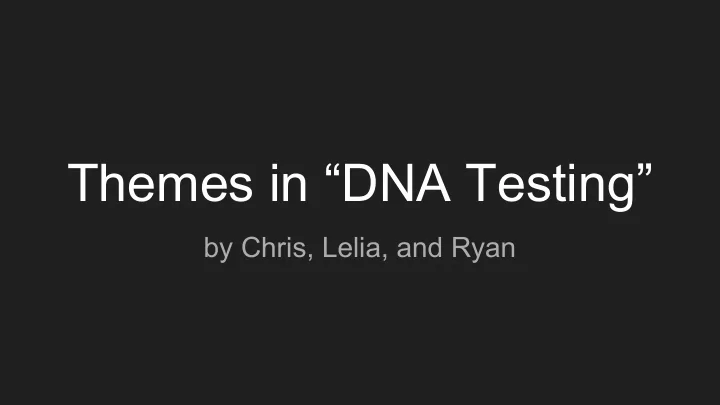

Themes in “DNA Testing” by Chris, Lelia, and Ryan
Innocent Until Proven Guilty ● Officer John Young was involved in the original case ● When he picked up the case 30 years later, he already suspected the McBenge Brothers ● Already had narrative in his head ● Was able to overlook inconsistent DNA evidence ○ Each scientist saw everything different ○ The brothers were convicted despite this ● Guilty Until Proven Innocent? ● Food For Thought: Is this really so uncommon?
...This Creates A False Sense of Security ● It’s easy to be wrongly accused, as seen in the case of Lukis Anderson - who served 5 months of jail time for a crime that he didn’t commit because his DNA was transferred to a crime scene via hospital equipment ● police/ prosecutors form a narrative and fit evidence to their theory when someone needs to be convicted ● "Had the McBenges’ DNA appeared on anything intimate to the crime, the defense believes there would be less to speculate about. ‘But it was on a damn cheese wrapper,’ said Short. And a cheese wrapper, she said, doesn’t tell the story of a murder" (Worth, 2015).
Conviction is good for business ● "Neither slavery nor involuntary servitude, except as a punishment for crime whereof the party shall have been duly convicted, shall exist within the United States, or any place subject to their jurisdiction." -13th Amendment of the United States Constitution ● Private Prisons ○ Prisons not run by the public sector and are instead run by corporations. ○ Like any corporation, the desired outcome is profit ● Prisons sell labour to private companies and pay inmates almost nothing and after fees inmates get even less ● Companies that have invested in prison labour include ○ American General Financial Group, American Express Company, Bank of America, Community Financial Services Corporation, Credit Card Coalition, Credit Union National Association, Inc., Fidelity Inestments, Harris Trust & Savings Bank, Household International, LaSalle National Bank, J.P. Morgan & Company, Non-Bank Funds Transmitters Group, American Petroleum Institute, Amoco Corporation, ARCO, BP America, Inc., Caltex Petroleum, Chevron Corporation, ExxonMobil Corporation, Mobil Oil Corporation, Phillips Petroleum Company, American Electric Power Association, American Gas Association, Center for Energy and Economic Development, Commonwealth Edison Company, Consolidated Edison Company of New York, Inc., Edison Electric Institute, Independent Power Producers of New York, Koch Industries, Inc., Mid-American Energy Company, Natural Gas Supply Association, PG&E Corporation/PG&E National Energy Group, U.S. Generating Company, Alliance of American Insurers, Allstate Insurance Company, American Council of Life Insurance, American Insurance Association, Blue Cross and Blue Shield Corporation, Coalition for Asbestos Justice, ( This organization was formed in October 2000 to explore new judicial approaches to asbestos litigation.” Its members include ACE-USA, Chubb & Son, CNA service mark companies, Fireman’s Fund Insurance Company, Hartford Financial Services Group, Inc., Kemper Insurance Companies, Liberty Mutual Insurance Group, and St. Paul Fire and Marine Insurance Company. Counsel to the coalition is Victor E. Schwartz of the law firm of Crowell & Moring in Washington, D.C., a longtime ALEC ally. ) Fortis Health, GEICO, Golden Rule Insurance Company, Guarantee Trust Life Insurance, MEGA Life and Health Insurance Company, National Association of Independent Insurers, Nationwide Insurance/National Financial, State Farm Insurance Companies, Wausau Insurance Companies, Zurich Insurance, Abbott Laboratories, Aventis Pharmaceuticals, Inc., Bayer Corporation, Eli Lilly & Company, GlaxoSmithKline, Glaxo Wellcome, Inc., Hoffman-LaRoche, Inc., Merck & Company, Inc., Pfizer, Inc., Pharmaceutical Research and Manufacturers of America (PhRMA), Pharmacia Corporation, Rhone-Poulenc Rorer, Inc., Schering-Plough Corporation, Smith, Kline & French, WYETH, a division of American Home Products Corporation, American Plastics Council, Archer Daniels Midland Corporation, AutoZone, Inc. (aftermarket automotive parts), Cargill, Inc., Caterpillar, Inc., Chlorine Chemistry Council, Deere & Company, Fruit of the Loom, Grocery Manufacturers of America, Inland Steel Industries, Inc., International Game Technology, International Paper, Johnson & Johnson, Keystone Automotive Industries, Motorola, Inc., Procter & Gamble, Sara Lee Corporation, AT&T, Ameritech, BellSouth Telecommunications, Inc., GTE Corporation, MCI, National Cable and Telecommunications Association, SBC Communications, Inc., Sprint, UST Public Affairs, Inc., Verizon Communications, Inc., Air Transport Association of America, American Trucking Association, The Boeing Company, United Airlines, United Parcel Service (UPS), Amway Corporation, Cabot Sedgewick, Cendant Corporation, Corrections Corporation of America, Dresser Industries, Federated Department Stores, International Gold Corporation, Mary Kay Cosmetics, Microsoft Corporation, Newmont Mining Corporation, Quaker Oats, Sears, Roebuck & Company, Service Corporation International, Taxpayers Network, Inc., Turner Construction, Wal-Mart Stores, Inc., Adolph Coors Foundation, Ameritech Foundation, Bell & Howell Foundation, Carthage Foundation, Charles G. Koch Charitable Foundation, ELW Foundation, Grocery Manufacturers of America, Heartland Institute of Chicago, The Heritage Foundation, Iowans for Tax Relief, Lynde and Harry Bradley Foundation of Milwaukee, National Pork Producers Association, National Rifle Association, Olin Foundation, Roe Foundation, Scaiffe Foundation, Shell Oil Company Foundation, Smith Richardson Foundation, Steel Recycling Institute, Tax Education Support Organization, Texas Educational Foundation, UPS Foundation
Questions ● Has anyone ever been to court? What was your experience? ● Should the outcome of a case solely rely on a jury? ● Should there be more rigorous qualifications for jury selection? ○ Would this create discrimination in the judicial system? ● What influence does the media have in court cases?
Works Cited ● "Primary Documents in American History." 13th Amendment to the U.S. Constitution: Primary Documents of American History (Virtual Programs & Services, Library of Congress) . Web. 18 Feb. 2016. ● Slogan, Bob. "Identifying Businesses That Profit From Prison Labor." PopularResistanceOrg . 19 May 2015. Web. 18 Feb. 2016. ● Worth, Katie. "The Surprisingly Imperfect Science of DNA Testing." FRONTLINE . PBS, n.d. Web. 17 Feb. 2016. ● Turner, Brian. My Trusty Gavel . Digital image. Flickr . Brian Turner, 17 Feb. 2009. Web. 18 Feb. 2016.
Recommend
More recommend